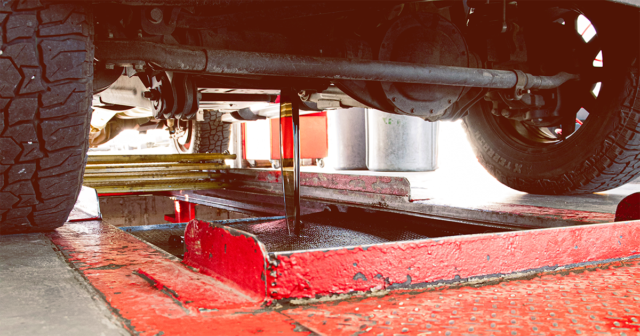Is it time for your vehicle’s next oil change? Don’t wait until it’s too late! Visit your nearest Kwik Kar location today and experience our professional oil change service. Our experienced mechanics at Kwik Kar are dedicated to keeping your vehicle running smoothly, safely, and efficiently.
Regular oil changes are essential for maintaining your vehicle’s performance and longevity. Engine oil lubricates the engine’s moving parts, aids in heat dispersion, and reduces friction. Over time, oil breaks down and becomes contaminated with dirt, debris, and combustion by-products. This can lead to increased engine wear, decreased fuel efficiency, and even severe engine damage. Understanding the signs that indicate your car needs an oil change can help you avoid costly repairs and ensure your vehicle continues to run smoothly. Here are the top signs that your car needs an oil change immediately.
Dashboard Warning Light
One of the most obvious signs that your car needs an oil change is the appearance of the oil change or check engine light on your dashboard. Modern vehicles are equipped with sensors that monitor the oil level and quality. These sensors are designed to alert you when the oil is low, dirty, or degrading in performance.
Ignoring this warning can lead to serious engine problems. The oil change light specifically indicates that the oil needs to be changed due to reaching the end of its useful life. The check engine light can also come on due to low oil pressure or other oil-related issues. Both lights should prompt immediate attention to avoid engine damage.
Engine Noise & Knocking
Oil lubricates the moving parts of your engine, preventing friction and wear. When the oil level is low or the oil is old and degraded, the engine parts don’t receive the lubrication they need. This can lead to irregular or unusual engine noises, like knocking or ticking. These sounds indicate that metal components are rubbing against each other without sufficient lubrication, causing increased wear and tear. Prolonged exposure to these conditions can lead to significant engine damage, such as worn bearings or even a seized engine.
Dark & Dirty Oil
Fresh, clean oil is amber in color and slightly translucent. Over time, as oil collects dirt and debris from the engine, it becomes darker and murkier. This change in color and consistency is a clear indication that the oil is no longer effective at lubricating your engine. Dark, dirty oil can cause various problems. Reduced lubrication means contaminated oil cannot lubricate the engine parts effectively, leading to increased friction and wear. Increased engine deposits occur as dirty oil can leave deposits and sludge in the engine, which can clog oil passages and reduce the engine’s efficiency. Overheating becomes a risk as dirty oil becomes less effective at dissipating heat, and the engine can overheat, causing further damage.
To check your oil, use the dipstick: remove it, wipe it clean, reinsert it, and then remove it again to examine the color and consistency of the oil. If it appears dark and gritty, it’s time for an oil change. Regularly checking and changing your oil can prevent these issues and keep your engine running smoothly.
Overheating From Engine
Overheating is a critical issue that can arise from neglected oil changes. When engine oil becomes old and degraded, it loses its ability to effectively lubricate and cool the engine’s components. As a result, the engine’s internal parts rub against each other, generating excessive heat. This heat can cause engine components to warp, crack, or even seize, leading to engine failure. Overheating can damage the head gasket, leading to coolant leaks and further compounding the problem.
Addressing the root cause by ensuring timely oil changes can prevent overheating and keep your engine running efficiently and safely. If you notice your temperature gauge rising or see steam coming from under the hood, it’s crucial to pull over immediately and get your vehicle checked by a professional.
Excessive Mileage
Routine oil changes are important for maintaining vehicle health and the longevity of your engine. While the frequency of oil changes varies depending on factors such as the manufacturer’s recommendations and the type of oil used, most vehicles typically require an oil change every 5,000 to 7,000 miles. However, if you have exceeded this mileage range since your last oil change, it’s wise to change this as soon as possible, even if you have not observed any other warning signs.
Extended mileage intervals can cause oil to degrade and lose its effectiveness, leading to increased friction and wear on engine components. By proactively staying on top of routine oil changes based on mileage, you can ensure that your engine remains properly lubricated and protected. This helps to prevent costly repairs and prolong the life of your vehicle.
Stay Ahead
Taking care of your car means taking care of maintenance. Regular oil changes are one of the most critical routine maintenance task you should not put off. By paying attention to the signs, whether it is a dashboard light flashing, strange engine noises, or simply realizing you have been putting on the miles, you are giving your car the attention it deserves.
Feeling uncertain about when or if your car needs an oil change? Let us take the guesswork out of the equation. Swing by any of our locations, and our friendly staff at Kwik Kar will assess your vehicle’s needs and provide the care it deserves. Drive in today for peace of mind and quick and expert service!

